
Daniel 11:40-45
...continued from Daniel 11:1-39< Back to Michael the Prince
Verse 40 now transitions to a new time period, the "time of the end", which is from 1798 to the Second Coming of Jesus (see Calculating the Time of the End). The precedents established earlier in Daniel 11, as well as the parallels in Daniel's other prophecies, provide the clues we need to identify the kings and wars described in verses 40-45.
- 1. First, we need to determine the eligible entities to be the KON and KOS. In following the precedent established early on in Daniel 11 (when Greece divided), the KON and KOS are the two main political powers rising out of a single realm when it divides, that war against each other, generally positioned north and south of each other (see more about the Precedents of Greece). We know from other prophecies that the realm in power during the time of the end is the realm of Rome. Once Rome divided in 486 AD, it was no longer centrally ruled, so there rose again a KON and KOS as we saw earlier in verses 25. Rome then remains divided until the Second Coming, however 3 (Heruli, Ostrogoths, Vandals) of the 10 divisions/tribes disappeared due to the influence of a political-religious power (the little horn, Papacy - Daniel 7:23-24), leaving 7 divisions plus the little horn to remain during the time of the end. So, the eligible entities who can be the KON and KOS are: English, French, Germans, Italians, Portuguese, Spanish, Swiss, and the Papacy (see more about the 10 horns in (Daniel 7).

- 2. Next, we need to determine the two main opposing political forces within that realm of Rome during the "time of the end" who fit the description of the verses. According to Daniel 11:40-45, we can expect two major European powers (2 of the 8 remaining entities that make up the Roman realm) to engage in a history-making war against each other and that it will involve significant battles in the Middle East (see more about the Middle East involvement).
Because of the plain and non-symbolic language used in Daniel 11, we can look at history to see when or if these events happened just as they are described in the Bible. As the upcoming Verse-By-Verse section will expound, history has already unfolded to fulfill this prophecy with precision and exactness in every detail. It shows that in the "time of the end" the two main powers (tribes) within the Roman realm that fought each other AND were involved in battles in the Middle East, were the British (United Kingdom / British Empire) (English tribe) and Germany (German Empire) (German tribe) in World War I and II. Not surprisingly, Daniel here again predicts the most significant wars of the era, just like each of the other wars described throughout Daniel 11 (examples include the second invasion of Greece (480 BC) during the Greco-Persian War (Dan. 11:2), the 6 Syrian Wars (274-168 BC) (Dan. 11:6-16), Mithridatic Wars (88-63 BC) (Dan. 11:18), Battle of the Teutoburg (9 AD) (Dan. 11:22), Battle of Vouille (507 AD) (Dan. 11:25-28) and now World War I and II (1914-1945 AD).)
"The world is stirred with the spirit of war. The prophecies of the eleventh of Daniel have almost reached their final fulfillment" (EGW, The Review and Herald, 1904).
The above quote from 1904 predicts a pending world war ("the world is stirred") that is related to the final fulfillment of Daniel 11. It also specifies that these pending struggles between nations will not cease and will increase until Jesus comes (The Review and Herald, 1904, Art. B, par. 7-8). Indeed, the World Wars that began in 1914 produced a continuing struggle that only grows more volatile as the end approaches.
- 3. Finally, we need to determine who is north and who is south. During the time of Greece, the king located generally more north of the other king was called the KON. The reference point is the realm itself, which at that time was focused in the Middle East. Now that we are looking at the realm of Rome, we have to shift our focus away from the Middle East and to the territory of the realm of Rome. This precedent was established in Daniel's vision in chapter 8. He saw the ram (Medo-Persia) pushing west (toward Babylon), north (toward Lydia) and south (toward Egypt) in relation to its location in the east (Dan. 8:4). He also saw the little horn (Rome), from its location in the west, waxing great toward the south (Carthage and Northern Africa), the east (Greece and Syria) and toward the pleasant land (Judea/Israel) (Dan. 8:9) (see more about the reference point in Precedents & Guidelines). Rome's territory after dividing was mostly in western Europe, but it expanded dramatically during the 1700s as the seven tribes settled in the new world. The American colonies were considered an extension of the Europeans' homeland. The Roman realm now includes much of Europe, USA, Canada, South America, Australia, and more. When looking at a map near the time of the World Wars, Britain (United Kingdom) is more north of Germany, and Germany is more south of Britain.
King of the North = The English Tribe
King of the South = The German Tribe
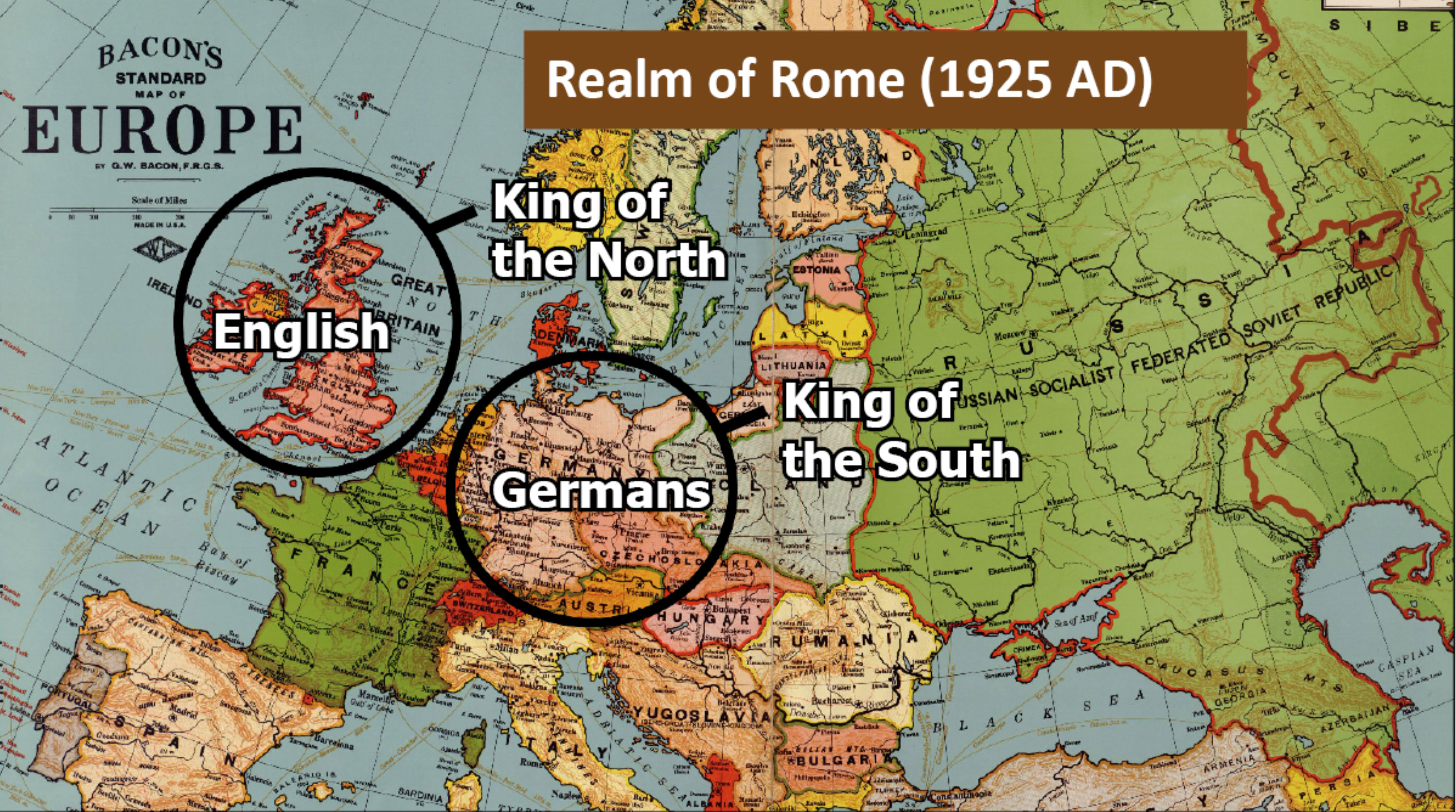
Map of Europe around 1925 with latitude lines.
Daniel 11:40
KJV: And at the time of the end shall the king of the south push at him: and the king of the north shall come against him like a whirlwind, with chariots, and with horsemen, and with many ships; and he shall enter into the countries, and shall overflow and pass over.NLT: Then at the time of the end, the king of the south will attack the king of the north. The king of the north will storm out with chariots, charioteers, and a vast navy. He will invade various lands and sweep through them like a flood.
The events of verses 40-45 would occur during the "time of the end", which is from 1798 to the Second Coming of Jesus. The angel discussion in chapter 12 gives us the information we need to calculate the start date of the "Time of the End" (see Calculating the Time of the End).
The King of the South pushes at the King of the North:
On July 28, 1914, World War I (1914-1918) broke out. Germany, under Kaiser Wilhelm II, had the largest army and was the primary leader of the Central Powers, which included Austria-Hungary and Bulgaria. Wilhelm had been building up the German navy for some time in an attempt to gain diplomatic power over Britain. His policies are said to be largely responsible for causing World War I. The Central Powers advanced west, invading Luxembourg, France and Belgium, and engaged the Russians in the east. Thus the two main warring horns of divided Rome clashed; Germany (German tribe/horn) and its allies attacked Britain (English tribe/horn) and its allies ("king of the south push at him").
At the same time, the Ottomans decided to take action to save their decaying empire and joined forces with Germany and the Central Powers. Germany and Turkey concluded a secret military alliance on August 2, 1914 and Turkey attacked Russian ports in the Black Sea on October 29. Russia, France, Montenegro, Serbia and Britain all declared war against the Ottomans between November 2 and 5. On November 14, the highest religious authority of the caliphate in Constantinople, on behalf of the Ottoman government, declared Jihad against the Allied Powers, calling Muslims across the world and promising them the status of martyr if they fell in battle.
The war eventually drew in all the world's economic great powers, including the Russian Empire, the French Third Republic, the United Kingdom of Great Britain and Ireland, Italy, Japan and the United States.
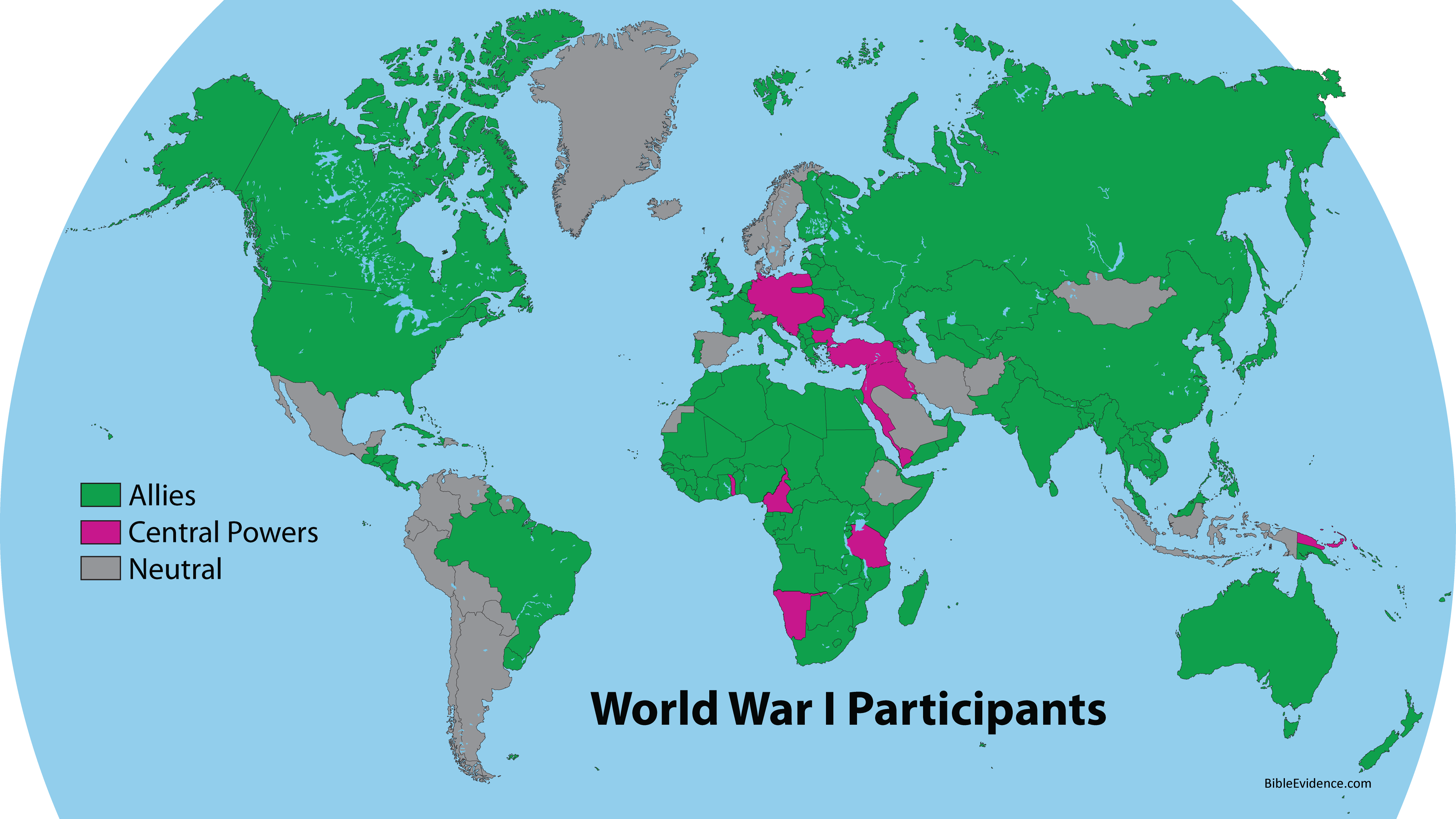
The King of the North comes against him:
The provocative actions of the Central Powers, led by Germany (German tribe/horn) ("king of the south push at him"), resulted in the Allied Powers, led by Britain (English tribe/horn) under King George V (1910-1936), responding like a fearful storm ("king of the north shall come against him like a whirlwind"). Britain declared war on Germany on August 4 and over the next four years there were many battles involving many countries and massive carnage. In the end, the Allied Powers were decisively victorious. They engaged militarily in various countries ("enter into the countries"), completely covering the areas and sweeping through like a flood ("overflow and pass over").
As a result of the war, radical changes were made to the European and Middle Eastern maps. Germany was forced to give up its overseas colonies and some of its territories in Europe, and the German Empire ceased to exist. The Austro-Hungarian Empire also ceased to exist as it was broken up into separate nations. New nations were created and many regained their former independence. Dynasties fell, countries were badly damaged and Europe was shaken to the core. The Ottoman Empire was also dismembered (1922) and its countries swept through by the Allies (more on this in the next verses).
Chariots, horsemen and ships:
Bible stories often refer to chariots and horsemen in association with the power of an army (Ex. 14:9, 1 Kings 20:25, Ez. 26:7). Horses were used extensively in World War I. All of the major combatants began the conflict with cavalry forces ("horsemen") and horses would pull carts ("chariots") of heavy artillery, supplies and people. As the war progressed, technology advanced, and there was a transition to more reliance on new weapons. This was the first war to use modern weapons, such as heavy artillery, machine guns, airplanes, barbed wire and armored tanks. The western front was where the modern methods were mainly used, while the eastern front and especially the Middle East continued to rely on horses.
The naval arms race between Britain and Germany was a major cause of World War I. The British had been dominant on the seas for years, but the Germans had worked hard to develop an impressive navy by the time the war began. Technology was advancing before and during the war to produce and improve equipment for sea warfare such as dreadnought battleships, battle cruisers, torpedo boats, destroyers, submarines and aircraft carriers. Dominance by Britain's navy ("many ships") was critical to the Allies' ultimate success and final victory.
Daniel 11:41
KJV: He shall enter also into the glorious land, and many countries shall be overthrown: but these shall escape out of his hand, even Edom, and Moab, and the chief of the children of Ammon.NLT: He will enter the glorious land of Israel,[a] and many nations will fall, but Moab, Edom, and the best part of Ammon will escape.
The word translated to "glorious" ("tsbiy") means beautiful or pleasant. Daniel later uses it to describe Jerusalem ("glorious holy mountain" - 11:45, 9:16). The same word is used to refer to the promised land into which the Lord led the Israelites after freeing them from Egyptian bondage: "In the day that I lifted up mine hand unto them, to bring them forth of the land of Egypt into a land that I had espied for them, flowing with milk and honey, which is the glory [tsbiy] of all lands:" (Ez. 20:6). Daniel also uses the word elsewhere (8:9, 11:16, 11:45), which are all associated with the promised land.
The Bible defines the Promised Land as the large section of land promised to the descendants of Abraham, located in the Middle East and centered in the region of Palestine. "In the same day the LORD made a covenant with Abram, saying, Unto thy seed have I given this land, from the river of Egypt unto the great river, the river Euphrates" (Gen. 15:18).
The king of the north would also enter ("He shall enter also"),, along with the other countries, into the Promised Land ("glorious land").. In 1917, the British defeated the Ottoman forces as part of the Sinai and Palestine Campaign during World War I. They captured Jerusalem in December and occupied Palestine.
Many countries will be overthrown:
When the Ottomans declared Jihad, the British and its allies immediately engaged the Ottomans militarily in the Middle East. The French and British also sent agents to foment revolution in Ottoman domains. The allied armies entered the Middle Eastern countries and within four years destroyed the Ottoman armies ("many countries shall be overthrown")..
Behind the scenes, the British and French concluded a secret treaty in 1916 (Sykes-Picot Agreement) to partition the Middle East between them. Northern Iraq, Lebanon, Syria and southeastern Turkey became French protectorates. Jordan, Southern Iraq, Kuwait and Palestine became British controlled territories.
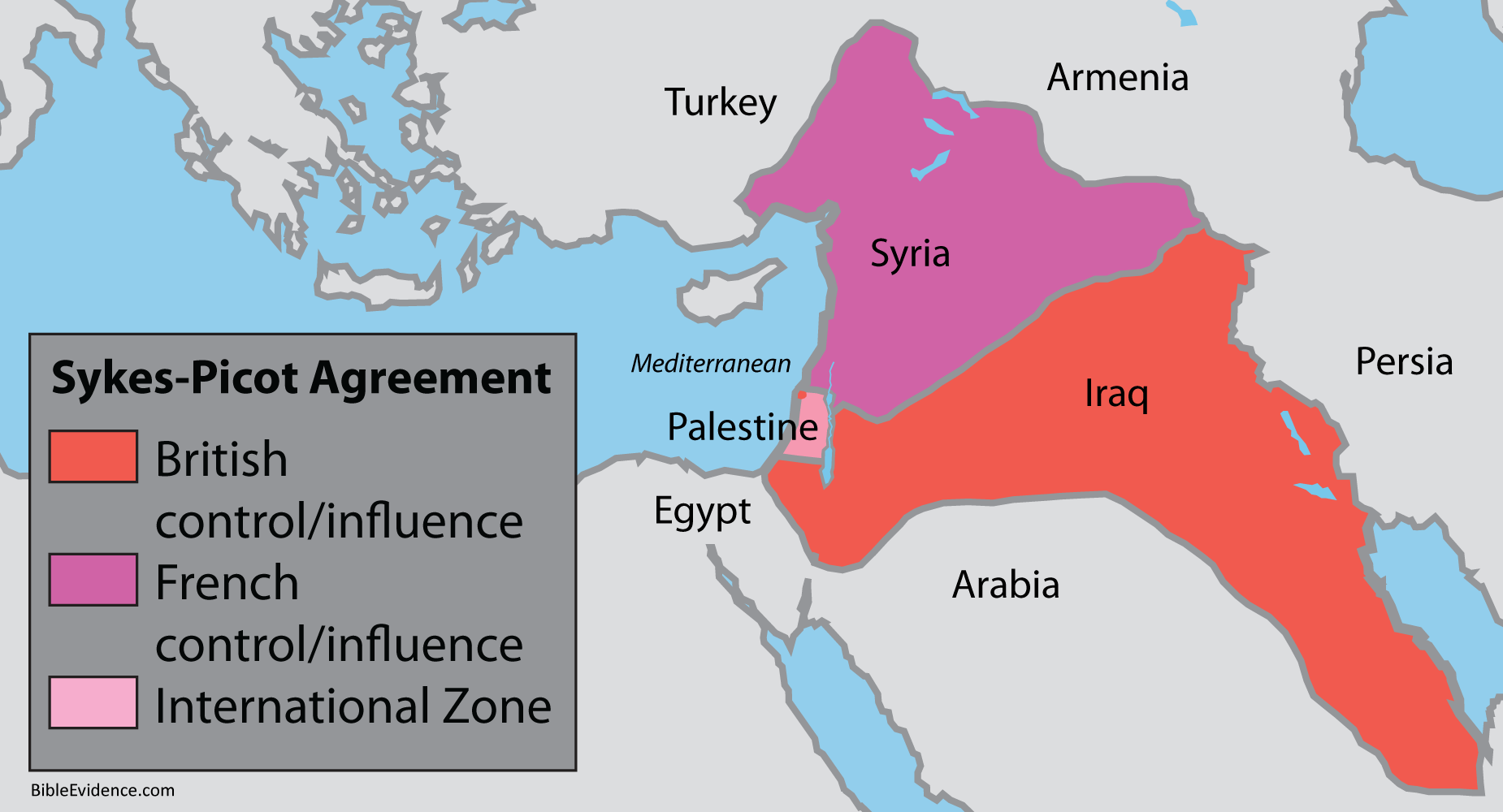
These shall escape:
During the 1800s, a movement called Zionism emerged. The movement was formalized in 1897 and expanded rapidly. In 1914, the British promised support to the Zionist movement to recreate a Jewish homeland. On November 2, 1917, the British issued a letter (the Balfour Declaration) to Lord Rothschild for transmission to the Zionist Federation of Great Britain and Ireland, officially stating its support for the establishment of a national home for the Jewish people in Palestine. The British captured Palestine and took Jerusalem on December 9, 1917. In 1920, the League of Nations established the British mandate of Palestine, which included the territory to the west of the river Jordan and the territory to the east of the river Jordan (see map below). The entire area was at first allotted for establishing a Jewish homeland.
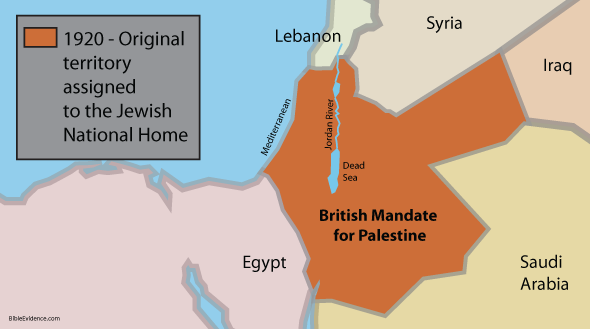
However, in 1922, Britain released the area east of the Jordan River from involvement in the Jewish settlement. The east area is where the people of Edom, Moab and Ammon were located in Bible times ("Edom, and Moab, and the chief of the children of Ammon"). These areas escaped from being part of the Jewish settlement ("these shall escape out of his hand"). The Mandate territory was formalized into two administrative areas:
- (a) Palestine, under direct British rule.
- (b) Transjordan, under rule of the Hashemite family from the Kingdom of Hejaz in present-day Saudi Arabia.
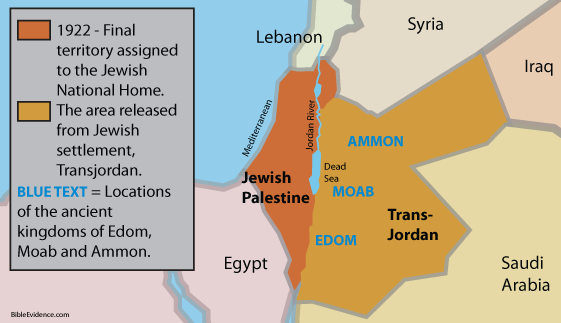
Note: The Hebrew word translated to "escape" in verse 41 is "malat", which means "to slip away". It can portray the sense of being rescued or being allowed to escape. These three areas were allowed to slip away. They didn't fight against the British to overcome them, but were released or let go by the British. An example of usage of the word malat is in 2 Kings 23:18 "And he said, Let him alone; let no man move his bones. So they let his bones alone [malat], with the bones of the prophet that came out of Samaria." Another example is Proverbs 28:26 "He that trusteth in his own heart is a fool: but whoso walketh wisely, he shall be delivered [malat]." Yet another example is Isaiah 31:5 "As birds flying, so will the LORD of hosts defend Jerusalem; defending also he will deliver it; and passing over he will preserve [malat] it." See also Isaiah 66:7 "Before she travailed, she brought forth; before her pain came, she was delivered [malat] of a man child."
Daniel 11:42-43
KJV: 42 He shall stretch forth his hand also upon the countries: and the land of Egypt shall not escape. 43 But he shall have power over the treasures of gold and of silver, and over all the precious things of Egypt: and the Libyans and the Ethiopians shall be at his steps.NLT: 42 He will conquer many countries, and even Egypt will not escape. 43 He will gain control over the gold, silver, and treasures of Egypt, and the Libyans and Ethiopians will be his servants.
Egypt was in the hands of the British from 1882 - 1956. Though Britain had occupied Egypt prior to the war, it was only after the Ottoman Empire declared war in 1914, that Egypt formally ceased to be Ottoman territory. The British declared Egypt to be a protectorate on December 18, 1914 ("the land of Egypt shall not escape"). The oil, trade routes and riches associated with the Suez Canal and other resources were controlled by Britain ("the treasures of gold and of silver, and over all the precious things of Egypt").
Note: It is a different Hebrew word translated to "escape" in this verse, "pelata", as compared to the previous verse, "malat". The word "peleta" in verse 42 is used in connection with the concept of a remnant. It is a portion that escapes, avoids something or is delivered. In this case (Daniel 11:42), Egypt would NOT be a remnant that would escape the whirlwind or avoid the hand of the King of the North. An example of usage of the word peleta is in Joel 2:3, where nothing escapes: "A fire devoureth before them; and behind them a flame burneth: the land is as the garden of Eden before them, and behind them a desolate wilderness; yea, and nothing shall escape [peleta] them." Another example is in Ezra 9:14: "Should we again break thy commandments, and join in affinity with the people of these abominations? wouldest not thou be angry with us till thou hadst consumed us, so that there should be no remnant nor escaping [peleta]?"
The passage draws special attention to Egypt, which was especially important and extensively under the hand of the King of the North. The British had become heavily involved in Egyptian affairs in 1875 when they purchased a 44% share in the Suez Canal Company. The control of "the precious things of Egypt," such as oil, was at stake. After riots in 1882, the British decided direct control of Egypt was needed and began to occupy Egypt. Lord Cromer became the British agent in Egypt in 1883 and ruled the country for the next 24 years. British advisers were placed in all areas of government. British forces were permanently stationed in Egypt and the Egyptian army was disbanded and recreated under British officers. In 1906, the Ottoman-British agreement gave Britain complete control over both Red Sea gulfs (Suez and Aqaba), including the Straits of Tiran. In response to German threats in 1914, military reinforcements were sent to Egypt and it was declared a protectorate. Between 1914 and 1922, Egypt was formally part of the British Empire. The United States recognized the British protection of Egypt in 1919. Britain declared Egyptian Independence in 1922 and created the Kingdom of Egypt. It was only nominally independent. The British kept control of foreign relations, communications and the military. The British occupied Egypt during World War II (1939 to 1945). In 1956, the British and French finally withdrew troops from the Suez.
Libyans:
The Libyans, in Bible times, were located to the west of Egypt, which basically corresponds to modern day Libya. In 1911, Libya was taken from the Ottomans and colonized by the Italians. The Senussi (a Muslim political-religious Sufi order and clan in Libya and Sudan) sided with the Ottoman Empire and fought against the Allies in World War I. The British forces defeated the Ottomans in 1917 in Libya, and on April 12 the Senussi accepted the terms of the British ("Libyans... shall be at his steps").
Note: On April 14, the Italians and Senussi signed the Treaty of Acroma that acknowledged effective virtual independence of Libya from direct Italian control. However, fighting between the Italians and Libyans resumed and the Italians took full control of Libya in 1930 until 1947 when Libya became independent.
Ethopians:
The Ethiopians, in Bible times, occupied the area south of Egypt on the Nile, also known as Cush. This corresponds generally to the country now known as Sudan. Before World War I, Sudan was united with the Kingdom of Egypt, but just like Egypt, it wasn't until 1914 that Sudan officially ceased to be Ottoman territory and formally became part of the British Empire ("Ethiopians shall be at his steps"). Britain administered control in Sudan between 1899 and 1956, even redrawing its borders in 1908. In 1954, Egypt and Britain agreed that Sudan should be granted independence in 1956.
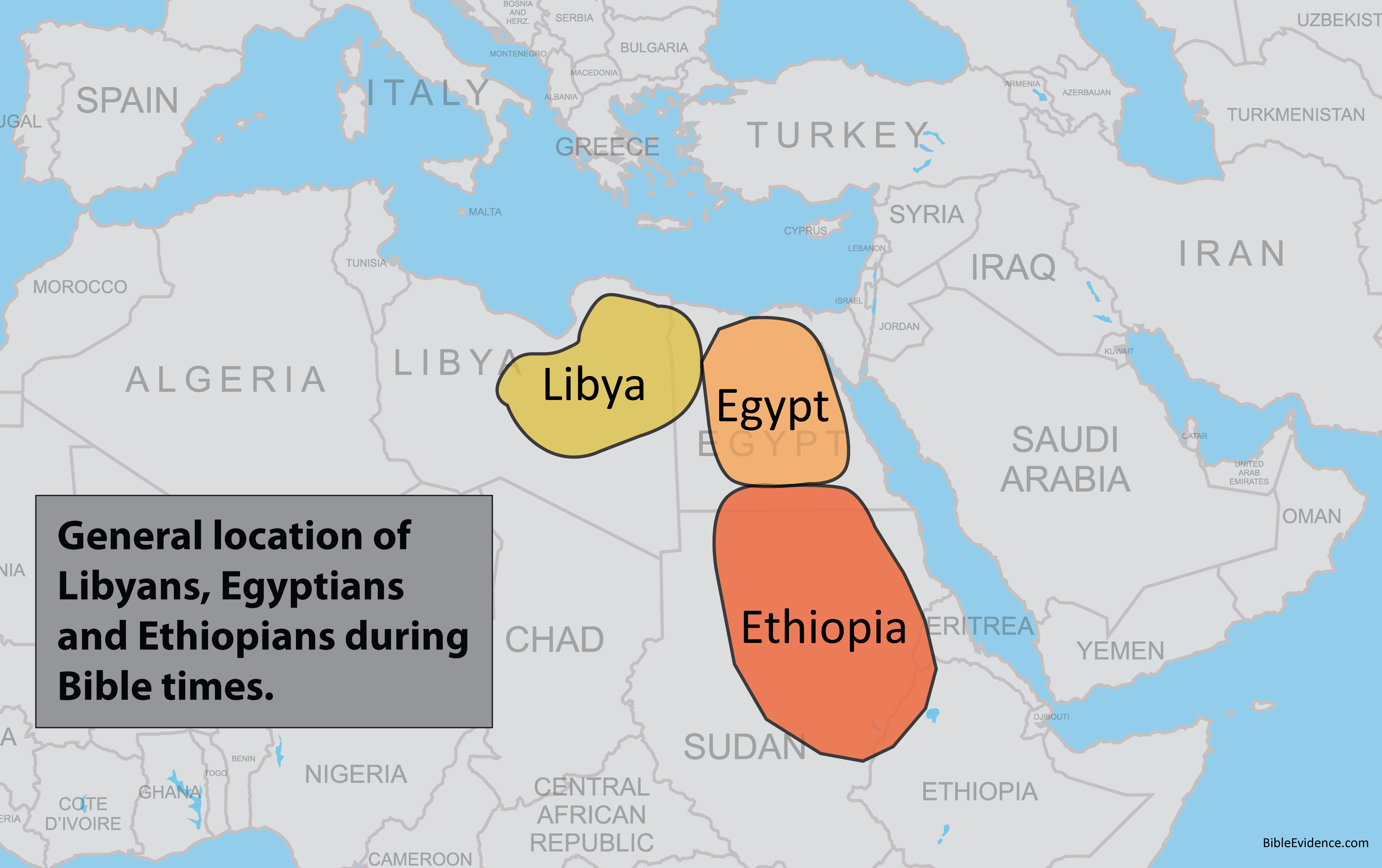
Daniel 11:44
KJV: 44 But tidings out of the east and out of the north shall trouble him: therefore he shall go forth with great fury to destroy, and utterly to make away many.NASB®: 44 But rumors from the East and from the North will disturb him, and he will go forth with great wrath to destroy and annihilate many.
World War I had a very destabilizing effect on the world. Its unresolved issues culminated in conditions that fueled World War II (1939 - 1945). The Empire of Japan had imperialist aims of dominating Asia and the Pacific and went to war with China in 1937 ("tidings out of the east"). Also during the late 1930s, Nazi Germany began making aggressive territorial demands in northern Europe (annexing Austria in March 1938 and invading Czechoslovakia in March 1939) and on August 24, 1939 made an agreement with the Soviet Union that included secret protocols to overrun the countries that lay between them ("tidings... out of the north").
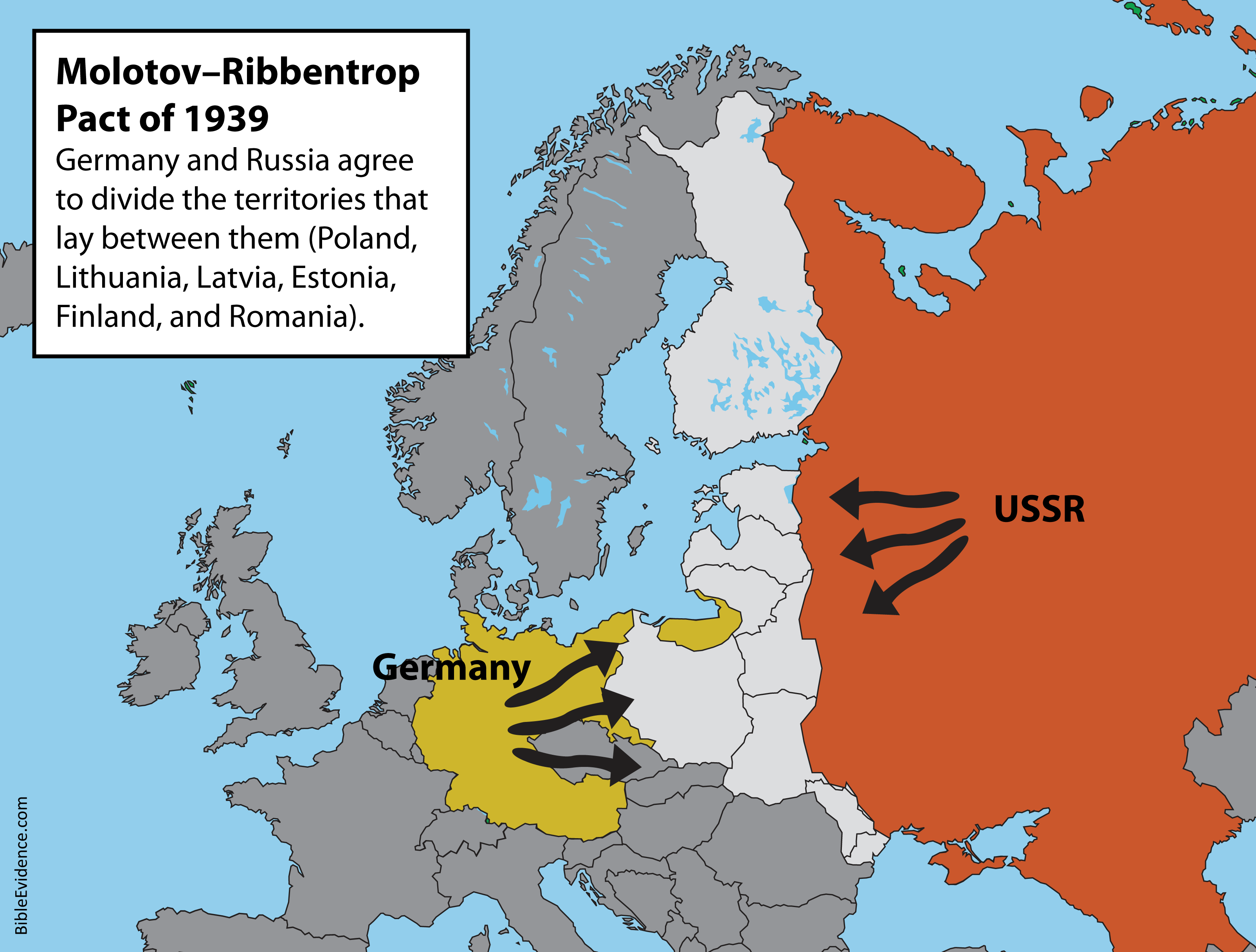
Note: The agreement was the Molotov-Ribbentrop Pact, a 10-year non-aggression pact. But, there was also a secret protocol to the pact, in which Romania, Poland, Lithuania, Latvia, Estonia and Finland were divided into German and Soviet "spheres of influence." There was shock and alarm across the world when the non-secret portions of the pact were announced. In addition, some of the secret aspects of the pact were leaked producing distrust and fear. Many, including Germany's allies, had only been aware of the British-French-Soviet negotiations. In September, Germany and the Soviet Union invaded Poland. Over the next several months the Baltic states of Estonia, Latvia, and Lithuania were forced to sign treaties and parts of Finland and Romania were invaded. On January 10, 1941, Germany and the Soviet Union signed another agreement and made additional secret revisions to the secret protocols of the prior pact. However, unbeknownst to the Soviets, Germany had been secretly preparing for an invasion of the Soviet Union since the summer of 1940. On June 22, 1941, Germany attacked the Soviets in Poland and launched Operation Barbarossa, the invasion of the Soviet Union. As a result, Russia suffered more deaths than any other nation in World War II.
In December of 1941, Japan (Emperor Hirohito) attacked the United States and European colonies in the Pacific Ocean, conquering much of the Western Pacific. By 1942, Nazi Germany, its occupied territories and allies controlled the majority of continental Europe, Southeast Asia and North Africa.
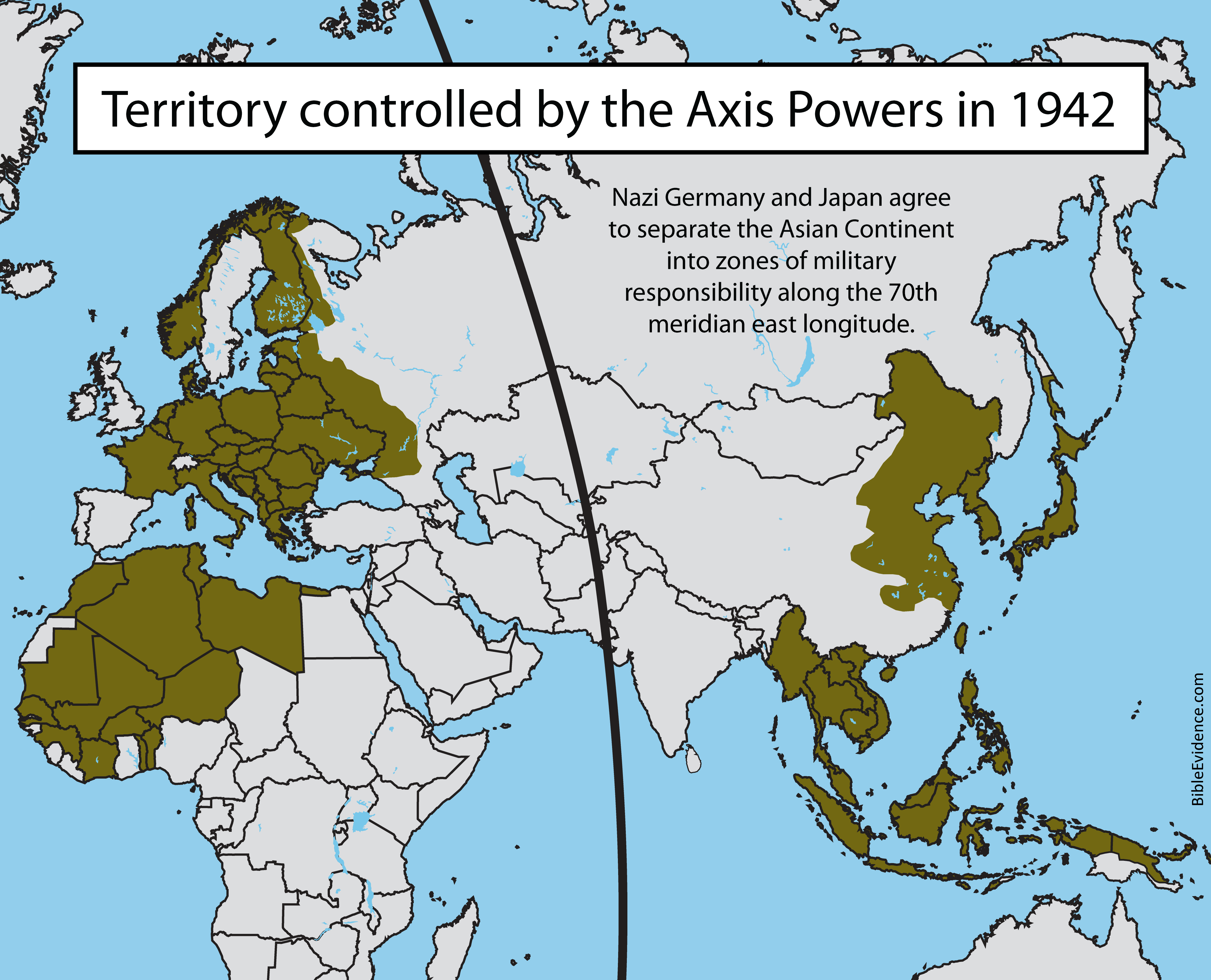
Note: The chief leader of the Axis powers was Adolf Hitler (Fuhrer of Nazi Germany - 1934 to 1945). His goal was to expand the territory of the German people until only they inhabited the globe. Hitler's ideology was racially motivated and the victims of his regime were considered subhuman. Nazi policy was to exterminate, expel and use as slaves all the non-Aryan people, which included Slavs, Roma, Poles, Serbs, Russians (later on), Jews, persons of color, and the physically and mentally disabled. Horrible atrocities were committed, including the Holocaust and the killing of an estimated 19.3 million civilians and prisoners of war.
King of North goes out with fury:
The activities of Japan, Germany and Russia disturbed and alarmed the English-led Allied powers ("trouble him") and caused them to rise up against the Axis powers. Britain (George VI reigned 1936 - 1952) and the United States (English tribe) led the effort (they were later joined by Russia). The war eventually involved the vast majority of the world's countries and was the deadliest war in human history.
The Allied powers steadily took back the territories lost, as hundreds of thousands died along the way ("go forth with great fury to destroy"). In 1942, the progress of the Axis powers was halted and the next 3 years saw repeated Axis defeats. In 1945, Berlin was captured, Hitler committed suicide and the Germans surrendered on May 8. The newly invented atomic bombs were dropped, in August, on the Japanese cities of Hiroshima and Nagasaki in which 129,000 people died instantly. Japan formally surrendered on September 2, 1945. The total casualties of the war are estimated at 50 - 85 million people ("utterly to make away many").

Danniel 11:45
KJV: 45 And he shall plant the tabernacles of his palace between the seas in the glorious holy mountain; yet he shall come to his end, and none shall help him.NASB®: 45 He will pitch the tents of his royal pavilion between the seas and the beautiful Holy Mountain; yet he will come to his end, and no one will help him.
Daniel uses the term "holy mountain" to refer to Jerusalem in Daniel 9:16 (see also Zech. 8:3, Is. 66:20, Joel 3:17). Here again, the Hebrew word "tsbiy" ("glorious") is used in association with the Promised Land. Jerusalem ("glorious holy mountain") is located between the Mediterranean Sea and the Dead Sea ("between the seas"). This last verse reveals that the King of the North would establish a royal home or place of rule ("tabernacles of his palace") in Jerusalem.
In 1945, after World War II, in order to prevent another such conflict, the United Nations was founded. In 1947 the British attempted to put the future of western Palestine into the hands of the United Nations, the successor organization to the League of Nations, which had established the Mandate for Palestine. The United Nations adopted a Partition Plan for Palestine. This plan would end the British Mandate over Palestine and create an independent Arab and independent Jewish state and an International Regime for the city of Jerusalem. The idea was to solve the conflict between the Palestinian nationalists and the Jewish nationalists. However, the plan was rejected by the Arabs.
The British decided to end the Mandate on May 14, 1948 and withdraw its troops by August 1. On May 14, the World Zionist Organization formally declared the establishment of the State of Israel. The USA (part of the English tribe/horn with Britain) recognized the new nation that same day, which was now critical to Israel's success as the balance of power had tilted from Europe to the USA as a global superpower (see more on the USA as part of the English tribe). On May 15, the Arab-Israeli War began. Combined forces of Egypt, Syria, Transjordan, Lebanon, Iraq, and Saudi Arabia fought against the Israeli forces. After 10 months of fighting, Israel took control of the area originally assigned to it in the Partition Plan, as well as almost 60% of the area assigned to the Arab state. It also took control of West Jerusalem (in 1967 it also took East Jerusalem).
Israel was admitted to membership in the United Nations on May 11, 1949 (the United Nations, which started out with 51 member states, now has 193). The internationalization of Jerusalem never materialized as the UN declared in 1947, and the UN still refers to Israel as the Occupying Power in Jerusalem. The conflict continues to this day, with Israel resolutely holding its ground in its capital, Jerusalem.
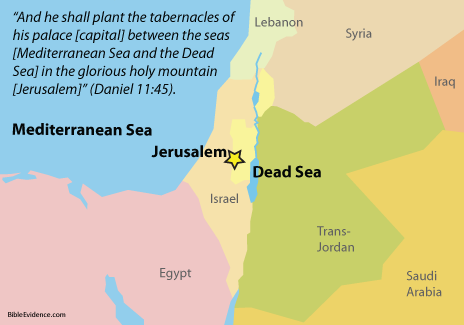
So today, we find ourselves in this situation, where the King of the North, the English tribe now led by the USA ("he"), has established and fixed ("shall plant") a dwelling place ("the tabernacles") or an outpost in Israel, specifically a place of rule or capital ("of his palace") between the Mediterranean Sea and Dead Sea ("between the seas") in Jerusalem ("in the glorious holy mountain"). Amidst all the controversy surrounding the Arab-Israeli conflict, verse 45 indicates that the King of the North will remain planted in Jerusalem until his power ends ("come to his end") because no one will help ("none shall help him").
The King of the North's loss of power appears to coincide with Michael standing up (Dan. 12:1) and the 7 last plagues ("time of trouble"). Other prophecies reveal that not only the KON comes to his end during that time, but all earthly powers and nations. Though the end is sure, any individual within these nations may choose to stand on the side of Jesus and be saved from the pending disasters.
Since the book of Revelation reveals that the USA is the primary end-time power (Rev. 13, 17), it is not unexpected to see the USA portrayed as the final KON in Daniel. The USA plays an increasing role in the English tribe's (KON) activities during World War I and II, becomes a global super power and leads the English tribe by verse 45. Since World War II, the USA has undoubtedly been the main power that ensures Israel's continuance through massive economic, military and political support.
The King of the North's end is the only event left in Daniel chapter 11 before Jesus ("Michael" - 12:1) puts an end to all the fighting. Daniel 12:1 to 12:3 conclude the angel's uninterrupted explanation of the vision. Amazing promises will be fulfilled to God's people at that time, including the reward of everlasting life!
In conclusion, it is a God worth serving and trusting who can tell the future and make provision for every person's need. Daniel 11:40-45 is only one of many remarkable Bible prophecies that may be seen precisely fulfilled in history. These give concrete evidence of the realness and veracity of God and His Word. "And now I have told you before it come to pass, that, when it is come to pass, ye might believe" (John 14:29).
Continue to Daniel 12
< Back to Michael the Prince
